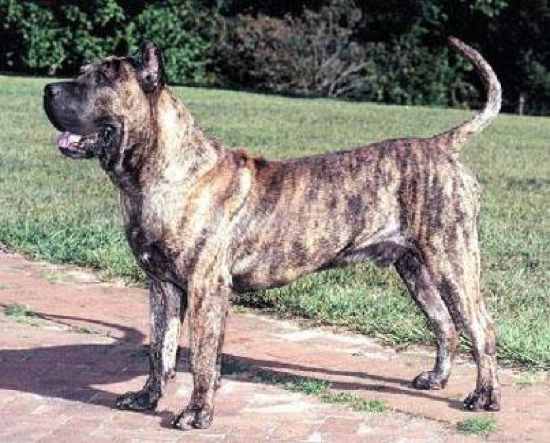WE ONLY CARRY THE FINEST TOP DOG K-9 LEATHER GEAR.At the new Canine Storewe will only sell high quality dog products. We pride ouselves in providing high quality products at an affordable price.
|
|
|
Deciphering Your Dog's Coughs ?
|
THANK YOU for stopping by and visiting.
About once a week or so I will write a pet related article or alerts about food recalls, new over the counter medication, proposed pet laws etc. The alerts and news items will be in the E-mail, most lengthy articles will be linked back to my web-site. If you would like to get an E-mail notification, I would appreciated very much if you would sign up and give me permission to E-mail you. Just send us a blank E-mail to
pet_articles@caninestore1.com
Deciphering Your Dog's Coughs.
Is It Kennel Cough? Dog Flu? Or A New Canine Flu Virus? |
 |
|
When is a cough serious? When it lasts more than five days, according to veterinarians at Kansas State University.

A dog might cough when it's dragging you down the street at the end of a leash, when it is excited or even when it is sleeping. Dogs cough occasionally, just like humans, but persistent or frequent coughing isn't normal. Coughs are symptoms telling owners that something is wrong with the dog's windpipe and/or lungs. When a dog coughs, it is using a protective mechanism to get rid of an offending material or increased mucus or phlegm produced by an inflamed lung or windpipe. Coughs may be intermittent or almost constant. They may be mild or severe, causing a gagging or vomiting reflex. They may be productive (dislodging mucus) or nonproductive (dislodging nothing).
Dogs contract coughs from
infections, including fungi, airborne viruses and bacteria, and certain parasites, such as heartworms, parasite migrations through the lungs, asthma and bronchitis Other potential causes include allergies, heart conditions, windpipe disease, tumors, lung cancer and inhalation from foreign particles, such as cigarette smoke. Some coughs may be seasonal, such as those related to allergies. Depending on its cause, a cough may last for hours or days. If the cough is caused by infections, some dogs get over them on their own when their immunity kicks in. Other pets require antibiotics, heartworm treatments, allergy medication or occasional surgery to remove a tumor. Cough medicines may help in some mild cases. Owners should consult a veterinarian if the dog's cough lasts for more than five days.
Dog Flu
News from the Illinois Department of Agriculture Sept 2005

A newly emerging respiratory pathogen in dogs has been identified as a virus belonging to the influenza A family. These viruses can infect humans, domestic animals, (pigs, horses, chickens, ducks), and some wild birds. The University of Florida College of Veterinary Medicine has isolated and identified H3N8 influenza virus as the cause of a serious respiratory disease in dogs in shelters, humane societies, boarding facilities and veterinary hospitals in Florida. Cases have been predominantly in Dade, Palm Beach and Duval counties. Racing greyhounds in Florida have also been affected. There are confirmed cases in New York State. This particular strain is not known to affect humans or poultry and appears to be a mutated form of the equine influenza virus. Influenza viruses are defined by membrane proteins that are distinguished by their genetic structures. These proteins are referred to as H and N. The H protein has 15 genetic subtypes and the N protein has 9 genetic subtypes. Very few of the subtypes have consistently circulated among people, (predominantly H1N1, H1N2, H2N2, H3N2), or domestic animals. Virtually all of the possible influenza subtypes exist among wild waterfowl. In birds the virus lives and is shed predominantly through fecal contamination. It is highly contagious among birds. Waterfowl are usually asymptomatic but it can be deadly to domesticated birds, such as chickens. Reassortment of the virus commonly occurs when 2 different subtypes are present in the same animal. Influenza virus has the ability to change its molecular antigenic structure making previously immune animals susceptible.
This disease in dogs can mimic the kennel cough syndrome caused by Bordetella bronchieptica/parainfluenza virus complex. Since it is a newly emerging disease virtually 100% of exposed dogs will become infected. Dogs may remain asymptomatic, exhibit mild illness, or present with severe pneumonia. Approximately 20% of the dogs will be asymptomatic. The remaining 80% will develop clinical illness with the majority showing a mild syndrome that presents as a cough with or without a low grade fever. The cough does not respond to antibiotics or cough suppressants and generally lasts 10 to 21 days. The cough may be soft and moist or dry. A purulent nasal discharge may develop which is generally caused by secondary bacterial infection and is responsive to antibiotics. This presentation is difficult to differentiate from kennel cough syndrome. Standard treatments for upper respiratory infections should be instituted regardless of the cause. The severe pneumonic syndrome presents as clinical pneumonia with high fevers (104 - 106), increased respiratory rate and difficulty breathing. Thoracic radiographs show generalized pneumonia with consolidation of the lung lobes.These dogs should be treated symptomatically with broad-spectrum antibiotics for secondary bacterial infections, hydration therapy, and other supportive care as needed. Mortality in these dogs is 1 - 5%.
No vaccine for canine influenza is currently available. The use of flu vaccines approved for other species is not recommended because of the potential for adverse and possibly fatal reactions. Influenza virus is transmitted by aerosolized respiratory secretions, contaminated inanimate objects (food bowls, dog crates), and people moving from infected dogs to uninfected dogs. The virus is easily killed with any disinfectant that will kill parvovirus. The incubation period is 2 T0 5 days and dogs can shed the virus for up to 10 days after the onset of symptoms. All dogs with symptoms of kennel cough or pneumonia should be isolated from other dogs for a minimum of 10 days after onset of symptoms to prevent spread.
There is no rapid test for canine influenza virus. Serology is available but antibodies do not develop until 7 or more days after the onset of symptoms. Convalescent samples 2 or more weeks after the onset of symptoms aid in the diagnosis. Positive serology testing only indicates that the dog was infected sometime previously, however a positive test gives veterinarians an indication that the influenza virus is in their community, so precautions can be taken with dogs presenting with "kennel cough". Early detection of virus in your community is important so that preventive measures may be instituted by careful handling of dogs with upper respiratory disease. Serum samples can be submitted to Cornell University Diagnostic Laboratory for testing for canine influenza virus. The cost is $20.00 per test and further information and submission forms may be found at: http://www.diaglab.vet.cornell.edu/news.asp
It's flu Season—for Dogs
Since most dogs are not vaccinated against canine influenza, nearly all dogs exposed are at risk of contracting the virus. Most people know that the latest flu vaccination can help them avoid the debilitating, sometimes deadly, effects of influenza. But few realize that a new vaccine can help protect their dogs against canine influenza. Dog flu,which has been confirmed in 38 states, is a growing problem throughout the United States, according to Petfinder.com (Tucson, Am.) Dogs don't have a natural immunity to the canine influenza virus, so nearly all dogs exposed to the virus will contract it. The virus spreads primarily through airborne particles and contaminated surfaces. Therefore, dogs visiting grooming salons, boarding kennels, day care facilities, training classes or dog parks as well as dogs in shelters and rescue facilities can be exposed to the virus. Merck Animal Health (Summit, N.J.), makes the only USDA-approved canine flu vaccine. Canine flu symptoms vary. Some dogs exhibit no symptoms but remain contagious. About 80 percent of infected dogs exhibit mild symptoms, such as fever, a runny nose and coughing. A small percentage of infected dogs experience high fever and develop pneumonia, which can be fatal. Since the majority of local dogs have not been vaccinated, canine influenza poses an merging threat to our pet community. UTiile Merck's Nobivac H3N8 canine flu vaccine doesn't make dogs immune to the virus, it decreases the severity of symptoms and limits the spread of the virus. Merck recently teamed with the Petfinder.com Foundation to donate nearly 1 million doses of the vaccine to approximately 1,400 animal shelters and rescue groups as part of its "Building Community Immunity" Program. Vaccinating dogs in shelters and rescues is an important step to help build community immunity against canine influenza because they are adopted out into various locations and move from state to state. You can prevent the spread of canine influenza virus and many other viruses by disinfecting surfaces frequently with bleach solutions and quaternary ammonium compounds. You also may be able to destroy airborne viruses by using traviolet light.
|
|
|